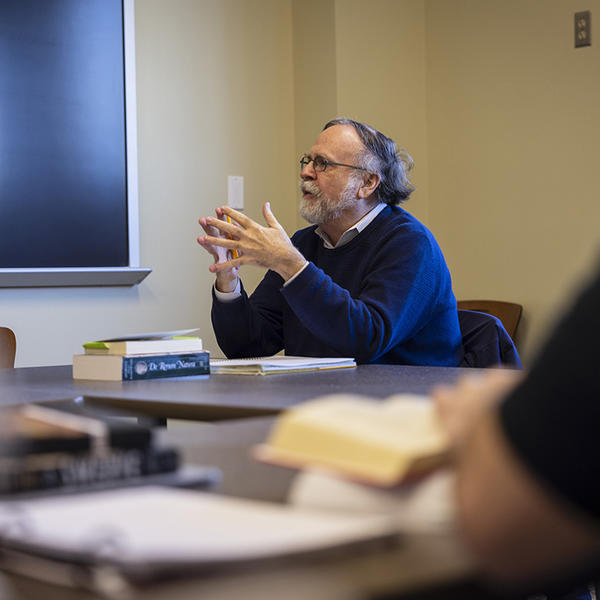It was 2013 midterm season at the College of the Holy Cross, and even though Professor John Little knew what to expect from the exam period, this year it felt different.
For the first time since graduating from Yale University in 1980, Little, a then 33-year member of the faculty, was the one taking the tests.
Not far from his office in Swords Hall, the professor of mathematics sat alongside students about half his age for a Greek midterm: "I was terrified going in."
He had begun taking courses at Holy Cross to better understand the history of mathematics and ancient Greek mathematical texts. Today, he's still enrolling in classes, most recently Latin 399 – Seminar in Lucretius. At this point, he says he now has enough credits to earn a degree in classics.
In 2017, he enrolled in Latin classes to translate "Practical Geometry" by Christopher Clavius, a Jesuit mathematician. Little translated all eight "books" of "Practical Geometry," finishing last November. The translation is now available online in the Holy Cross library to all audiences free of cost.
"I don't teach the mathematical texts, but he's able to apply what he's learned to read something that’s very technical," said Mary Ebbot, professor of classics, who taught Little's first Greek class. "It's not the poetry we're reading, the history in this course or the biographies and Plutarch. It's a great example [for students,] taking what you learn and then growing on your own as well."
Like many students at Holy Cross, a professor guided Little along his educational journey.
After Little took an ancient science class on campus, Neel Smith, a professor of classics, suggested that he enroll in ancient Greek to translate mathematical texts from the past.
Little listened. But before the first day of classes, Ebbott briefed him on the course inside Swords 330, not far from his office. The syllabus included quizzes almost daily, students working together in small groups, and midterm and final exams.
Ebbott left it up to her colleague to decide how much of the syllabus he wanted to follow. Little embraced it all.
"I think every professor should do this. It really keeps you up to date with what it's like to be a student," Little said. "A lot of us forget after a while. So preparing to take the exams, writing the papers, it's been a great learning experience in a lot of ways."
Little normally sat in the middle of a room that was filled with two or three rows of chairs. Before each class, he, like most other students on any college campus, participated in the usual small talk commenting on the difficulty of the previous night's assignment.
"He would discuss the homework or if there was some kind of assessment coming up," classics major Melody Wauke '17 said. "We were all in the same boat. He may be an expert in math, but we were all still learning Greek, so it was nice. It didn't matter that he was older than us or an authority figure, we’re still struggling with the same vocabulary and grammar."
Wauke, who earned a degree in classics from the College, first met Little playing the role of professor for her class on the history of mathematics.
"He was a great professor, very engaging," Wauke said.
The two crossed paths again within the Holy Cross Orchestra, each playing the viola. Little sat in back of the room to avoid the spotlight and keep all eyes on students.
“He is a very talented violist,” Wauke said. “Everything I interacted with him in, I was always amazed at how skilled he was and how much work he put into everything.”
Ebbott witnessed the same respect for Little within her classroom. Initially, she said, students were intimidated when they realized he was also taking the class, but didn't take long for them to utilize him as an asset. Soon they stopped referring to him as "Professor Little" and began calling him "John."
"He has a great way of always asking valuable questions. It’s his question, but it's always something that would contribute to everyone’s learning. I think that was always great for me as the teacher to be thinking," Ebbott said. "We talk about the problem of knowledge, when you know something it’s hard to remember what it’s like not to know it."
Nine years after his first-class, Little is now learning with his third cycle of Holy Cross students.
"We’re teachers and we’re still learners, too. Unfortunately, after you get your Ph.D., a lot of the learning you’re doing is going on at a very individual, maybe in a lonely, way a lot of the time," he said. "So getting back into the situation where you're having an experience of being a part of a group and having the camaraderie of being in a class with other students, the fact that I was able to do this with the courses of our classics department rather than just trying to learn it on my own, really made all the difference."
'I think every professor should do this': Prof. John Little is completing his ninth year of classes at Holy Cross

Little began taking classics courses to better understand mathematics
Read Time
4 Minutes

